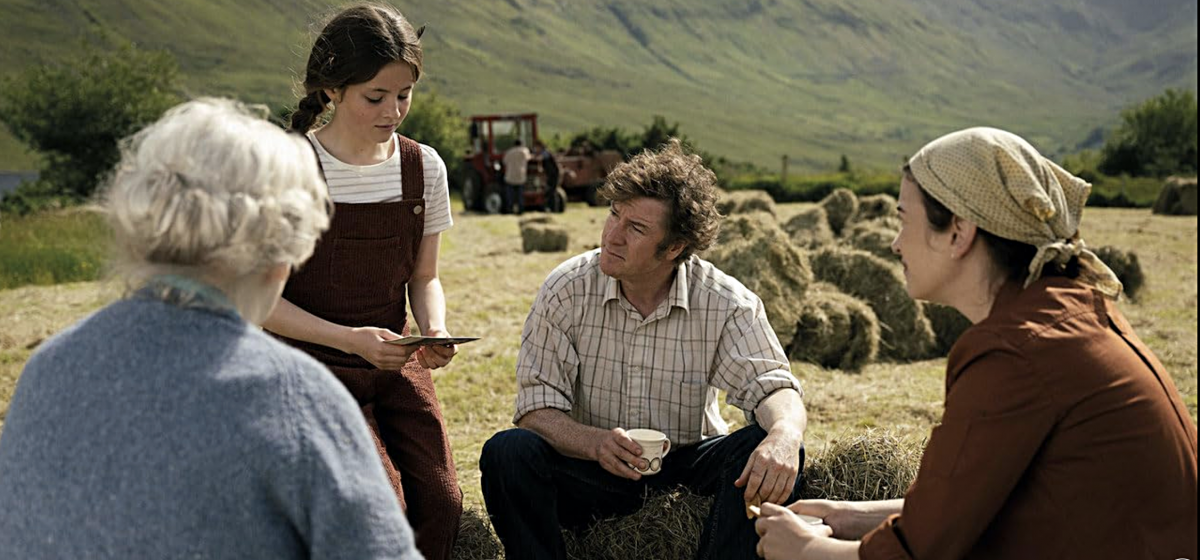
Time passes slowly here in the country, which is the whole point of the new film, That They May Face the Rising Sun. The countryside in question is Ireland’s. Our visit will be punctuated by languid, ruminative shots, a rich celebration of a simpler way of life.
We see it through the eyes of middle-aged British expats, Joe and Kate Ruttledge. Joe is a writer, Kate a photographer and gallery owner. They’ve bought a farm in this small lakeside community as an escape, but find themselves deeply immersed in the day-to-day life. Their rustic kitchen is open to all. Their small farm is the hub of activity, and they host a variety of characters and confidences. Out of earshot, one character asks another, “Still here, are they?” surprised that they haven’t scurried back to the comforting chaos of London.
The clash of the old and new ways is the film’s frisson. Joe has found “all that life could give of contentment and peace.” Erecting a structure with a crusty local, Patrick, he pauses to appreciate the quality of light defined by the frame. Patrick has no such sensitivities. “People have been locked up for saying less,” he replies. Joe praises the tranquility. Patrick hears the birds chirping and offers, “listen to the fucken quiet and see if it don’t drive you daft.” A business associate of Kate’s visits and comments that Bill, another local, is like “something out of a Russian novel.” Kate bristles. “He’s all ours,” she bristles. Offers Patrick: “Country’s full of battered folk.”
Barry Ward—whose face you’ll instantly recognize from many BBC shows—plays Joe as a generic Everyman, accommodating and wise yet capable of great empathy. He moves through the movie wearing the same white button-down shirt, whether jotting notes or doing heavy labor. Kate—played by Anna Bederke, a German actress of classical beauty—is beatific, blessed virgin of the kitchen, childless herself yet everyone’s mother. As narrative figures, Joe and Kate provide beacons, a point of focus, that raise That They May from a reenactment of the simple life into a meditation about its loss.
The understated acting of Philip Dolan (Jamesie), Brendan Conroy (Bill), Lolar Roddy (Patrick), John Olohan (The Shah), Ruth McCabe (Mary Murphy), and Sean McGinley (Johnny), et al., in their roles adds to the authenticity. There isn’t a false note in the cast; kudos to all.
Director Pat Collins has the features Silence (2012) and Song of Granite (2017) to his credit. His screenplay with Eamon Little is a tapestry of serene moments so nuanced that they don’t immediately reveal their literary shape. First viewing is simply a delight: a surrender to the power of cinema as it delivers its sumptuous message. On second viewing, one appreciates more the lynchpins of the plot: church (if not religion), rituals, family and community, gossip, and legacy.
All this is abetted by Keith Walsh’s editing and Richard Kendrick’s cinematography, and their lingering shots of the countryside. The ever-present chirping birds are modulated by sound recordist John Brennan.
That They May Face the Rising Sun is authentic to a fault. Hay is baled, sheep are herded, fireplaces lit, we run across an open field to meet the mailman, beehives are tended for honey, we stroll down bucolic lanes laced with green foliage. (This motif, people walking away from the viewer toward an infinite horizon, becomes the equivalent of “walking toward the light.”)
It's also telling that the action is set in the 1970s, undiscernible but for its lack of technology. Joe writes with a Bic pen and a portable typewriter. In its subversive way, That They May Face the Rising Sun posits a world before the internet and what social media might do (or probably has done) to make this idyll a thing of the past.
__________________________
That They May Face the Rising Sun. Directed by Pat Collins. 2023. From Fís Éireann, Ireland, and the BBC Northern Ireland. Distributed by Juno Films. Runtime 111 minutes.
